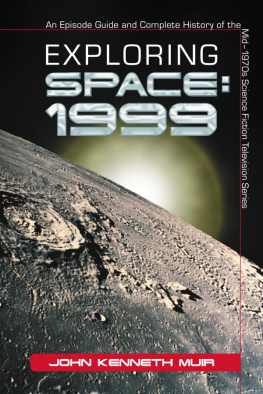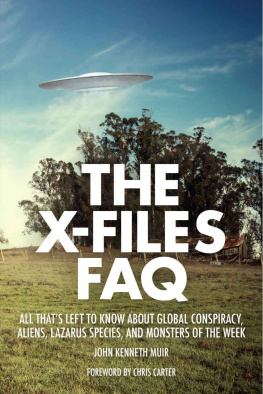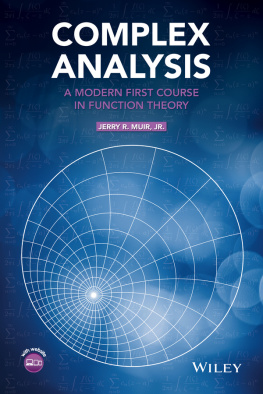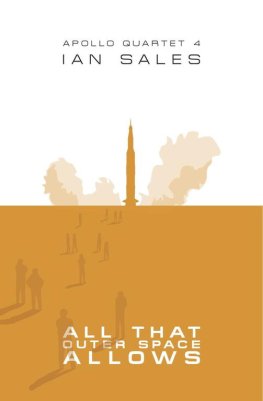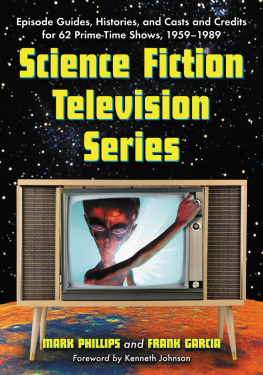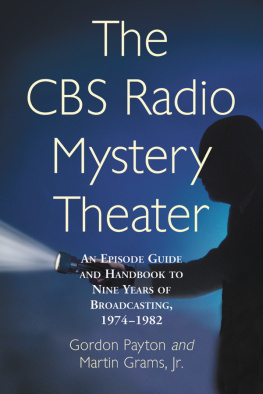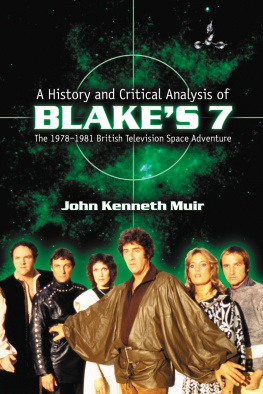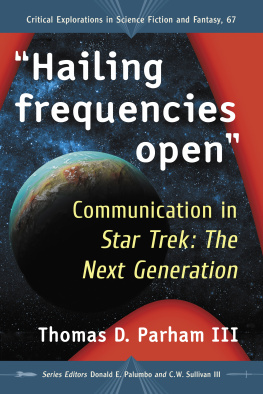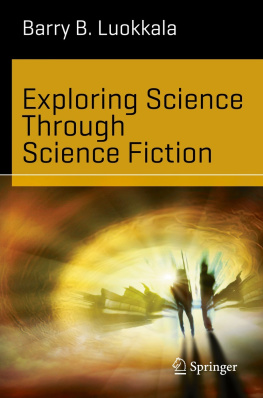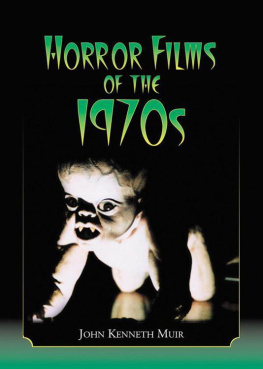
Table of Contents
Cmdr. John Koenig and CMO Helena Russell behold a universe rife with mystery, terror, and dark alien secrets in Space: 1999. Artwork by John Semprit.
LIBRARY OF CONGRESS CATALOGUING-IN-PUBLICATION DATA
Muir, John Kenneth, 1969
Exploring Space: 1999 : an episode guide and complete history of the mid1970s science fiction television series / by John Kenneth Muir
p. cm.
Includes bibliographical references and index.
ISBN 0-7864-2276-9
1. Space: 1999 (Television program) I. Title.
PN1992.77.S6397M85 2005
791.45'72dc21 97-659
British Library cataloguing data are available
1997 John Kenneth Muir. All rights reserved
No part of this book may be reproduced or transmitted in any form or by any means, electronic or mechanical, including photocopying or recording, or by any information storage and retrieval system, without permission in writing from the publisher.
Cover image 2005 Photodisc
McFarland & Company, Inc., Publishers
Box 611, Jefferson, North Carolina 28640
www.mcfarlandpub.com
For Kathryn,
my impartial Space: 1999 watcher
and beautiful wife.
And for my parents,
who sparked my imagination
and kept the ame lit.
Acknowledgments
This author gratefully acknowledges the hard work and assistance of the following people, without whom this book would not be possible:
Terry Bowers, Arthur Cohen, George Eichler, Jovan Michael Evermann, Robert Farnham, Robert Hamon, Maggie Kennedy, Kathryn Leftwich, Kenneth Muir, Lara Muir, Janet Mullis, Glenda Nicholls, William Poston, Catherine Schell, John Semprit, Pat and Brian Shaw and Jared Schwartz.
Introduction
Space: 1999 occupies a unique and not altogether happy position in the Valhalla of televised space adventures. It is the program that Star Trek fans love to hate, even 20 years after its debut. When it is not being ridiculed or attacked, 1999 is often forgotten or overlooked by science-fiction historians and television critics, probably because it was a British-made product that never aired on the major American television networks. Perhaps Space: 1999s biggest problem is simply that it appeared at the wrong time. It stands sandwiched between Star Trek (19661969) and Star Wars (1977), two milestones of the genre. Star Trek is noteworthy because it was the first serious space program to feature continuing characters, and Star Wars, of course, opened up a whole new realm of amazing special effects and make-ups. But between those great accomplishments stands a seldom-seen, spectacular exploration of the unknown that deserves far more attention than it has received.
Space: 1999 premiered in September of 1975 and featured the ongoing outer space adventures of Commander John Koenig, Dr. Helena Russell, Professor Victor Bergman, and the 311 astronauts and scientists stationed on Moonbase Alpha. What made this series unique was that these intrepid heroes journeyed through space not aboard a warp-driven starship, but on the moon. On September 13, 1999, a surge of magnetic energy caused the nuclear waste dumps on the far side of the moon to explode. The result was like a giant nuclear engine, pushing the moon out of Earths orbit and into a space warp which ultimately deposited the moon light-years across the galaxy.
Starring internationally renowned actors Martin Landau, Barbara Bain, Barry Morse and Catherine Schell, Space: 1999 was the only serious space adventure of the early 70s. Star Trek was long gone from first-run, and although Planet of the Apes (1974) and Harlan Ellisons The Starlost (1973) had premiered before Space: 1999, both shows concerned bizarre future cultures rather than space travel. Battlestar Galactica, the next big outer space extravaganza, did not arrive on the scene until late 1978, and by then Star Wars had changed the face and feel of science fiction television forever. Therefore, for all intents and purposes, Space: 1999 was the only truly original space adventure of the decade.
Even though it is locked between two juggernauts of sci-fi, Space: 1999 pioneered many of the groundbreaking visual effects that would later make such a dramatic impact in Star Wars. Perhaps more significantly, many major 1999 character and story concepts would be repeated in the successful Star Trek productions of the 80s and 90s, particularly The Next Generation.
There is, however, much more to appreciate in Space: 1999 than its historical position. It featured one crucial element that Logans Run (1977), The Fantastic Journey (1977), Battlestar Galactica (1978) and Buck Rogers in the 25th Century (197981) all lacked: a brilliant and consistent vision of the universe. Indeed, the first 24 episodes of Space: 1999 featured a richly-visualized world where space was a terrifying, confusing and spectacular mystery. Each story explored the unknown, and portrayed the Alphan space voyage as a journey into wonder, awe and horror. Unlike the futuristic superheroes of Star Trek, the travelers on Moonbase Alpha were recognizably human and contemporary. They were unprepared both technologically and psychologically for a long voyage into deep space, and as a result their emotions, fears and attitudes often caused more harm than the aliens or space phenomena they encountered.
While Star Trek treated all problems as soluble and offered enjoyable stories laced with light social commentary, Space: 1999 episodes were often downright grim. The series was obsessed with mankinds failings and dark questions of existence. As performed by series leads Landau and Bain, the main Alphan characters were tightly-focused and hyper-intense. There was just no time for these men and women to engage in the saucy banter that had won over so many viewers to Star Trek. In many ways, Space: 1999 was much more a child of Joseph Stefanos The Outer Limits (196162) or Rod Serlings The Twilight Zone (195964) than of Gene Roddenberrys Star Trek. Replete with effectively dark photography, stylish feature-film techniques, gothic story lines and a Wagnerian musical score, Space: 1999 represented the dark side of space adventure that has so often been ignored in favor of Star Treks rosier vision of the future.
Space: 1999 is also the only science-fiction television program in history that could legitimately lay claim to exploring the issues of Generation X. Akin to the members of this disaffected generation, Space: 1999 was born after Watergate and Vietnam. Considering this, it is perhaps fitting that various episodes reflected a distrust of politicians (Breakaway, Earthbound and Dragons Domain) or addressed the futility of war (The Last Enemy, War Games).
More importantly, and this is undoubtedly the reason Space: 1999 is so universally despised by scientists, the program consistently and vehemently expressed distrust of the mainstream scientific community. In Star Treks sunshine view of future technology, science had shaped mans world into a perfect society with no hunger, no disease, and no crime. In contrast, Space: 1999 was, in the words of Science Digest, about the downfall of 20th century technological man. Beyond the initial scientific disaster which establishes the premise of the series, many
Next page
